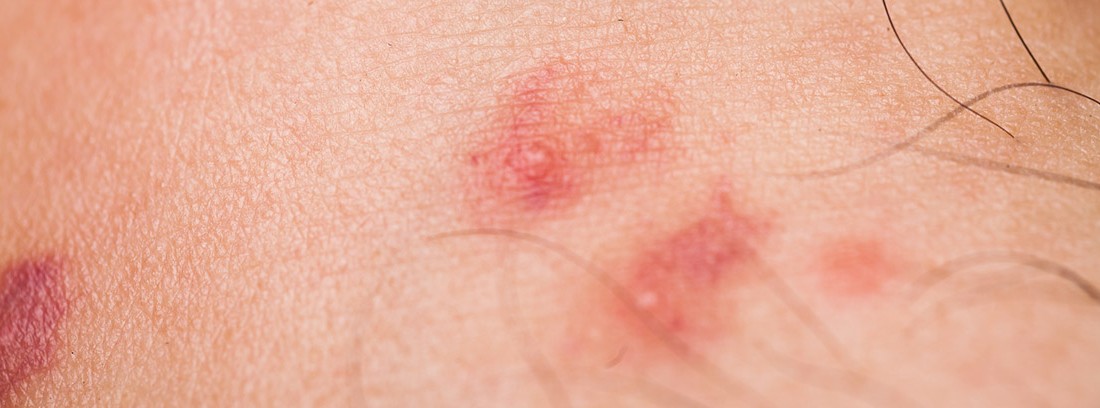How to treat flea and other insect bites?

In most cases they are mild and can be treated with any pharmacy product prepared for bites or even ice. But sometimes, the bites of certain insects, such as bee or wasp, can produce allergic reactions locally or generalized if there is a special sensitivity, requiring urgent medical attention.
What symptoms do insect bites produce?
The symptoms that are more frequent and do not imply a medical emergency are the ones that appear locally:
- Localized pain
- Redness
- Swelling of the area
- Intense itching
- Burning
- Hardening
- Tingle
Them severe reactions they are rare and are usually linked to allergies to bees or wasps. These reactions called anaphylactic appear within minutes of the bite, must be treated urgently and are characterized by a picture of:
- Generalized itching
- Tearing,
- Watery discharge from the nose
- Cough
- Sensation of "foreign body" in the neck
- It can even cause shortness of breath and dizziness.
How to act in case of sting
- Remove the stinger scratching with a card. If forceps are used, care must be taken not to squeeze the venom sac in the case of bee stings, as this would increase the amount of venom injected.
- Wash the area well affected with water and mild soap.
- Apply ice wrapping in a cloth handkerchief for 10 minutes.
- Apply an ointment with corticosteroids.
- Observe the affected person for a few hours for immediate complications or possible infection.
If the affected person has the symptoms of anaphylactic reaction described above, contact the medical service in the area and transfer him to the hospital closest urgently.
Flea bite
The flea is an insect that and other domestic or farm animals and can chop to the human being, since feeds on your blood. Since the flea is a flightless but jumping insect, the bites are usually grouped in lines of 3 or 4 red dots, which causes the insect to jump and bite.
Then it can remain on the host's clothing or skin, but it is not usual, since it tends to parasitize another animal or person. A flea that is hosted on a mammal to feed on can live up to three months. In contrast, a flea without a host will barely exceed two weeks of life.
For this reason, it is essential for these insects to have a stable food source over time. Flea bites they do not transmit any disease in our midst. In the past they could be vectors of plague and typhus.
Bed bug bite
The bed bug (Cimex lectularis) is a small insect that accumulates in lto bedding or dusty areas. Insect bites are common when traveling to rural hotels or when cleaning the dust or furniture at home.
The bites resemble flea bites in that they are also grouped or linear and they are usually very itchy and annoying. When chiches are detected at home it is important to fumigate under beds, furniture, and sofa covers and bedspreads.
Tick bites
The tick it is a mite that also feeds on blood. It is common for them to parasitize people when they have gone on a field trip. When clings to the skin looks like a small spider, but when it swells when feeding it has the appearance of a lentil attached to the footl.
Most of them are painless and cause only mild signs and symptoms:
- Redness
- Inflammation
- Small ulcer on the skin
Some ticks transmit bacteria They cause diseases called rickettsiosis (Rocky Mountain Spotted Fever and Mediterranean Button Fever). It causes symptoms like:
- Rash on the skin
- Fever
- Headache
- Articulations pain
- Swelling of the lymph nodes
Therefore, when faced with a bite of this type, the insect must be removed well and, at the doctor's discretion, carry out a antibiotic prophylaxis to prevent the development of rickettsiosis.
How to remove a tick?
Removing a tick can be difficult, so carefully follow these steps:
- Must be used tweezers to catch the tick near the head or mouth. Removal should not be attempted with popular methods such as cigarettes or matches.
- Throw of her with a slow and steady movement. Sometimes the entire tick cannot be removed and its teeth can remain in the skin. When suspecting, you have to.
- Must wash up then skin and hands with soap and water
- It is better to keep the insect in a jar in case you have to go to the doctor later so that he can find out the species.
The way to prevent tick infestation is based primarily on wearing long clothing, tucking pants into socks, and take a good look at the skin after an excursion to suspicious areas. If there are dogs in the environment, their skin should be explored and kept dewormed as directed by the veterinarian.
Spider bites
There are very poisonous spiders, such as european tarantula, which can cause bites with a lot of inflammation. Some may cause ulcers and even death, such as the brown house spider or the black widow, which has a very powerful neurotoxin.
However, most of the spiders in our environment do not usually cause serious problems. At most, they cause bites with some necrotizing capacity, causing wounds and ulcers that can take a few weeks to heal, and can leave a residual scar.
What you should know:
- The flea is an insect that usually parasitizes dogs and other domestic or farm animals and can sting the human beingas it feeds on your blood.
- Flea bites they do not transmit any disease in our midst.
You have doubts?Sign up for Savia, MAPFRE's digital health services platform and talk to a person so they can see and guide you about the type of bite you have.
SIGN UP FREE
Dermatology Specialist
(Updated at Apr 13 / 2024)